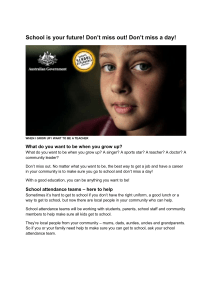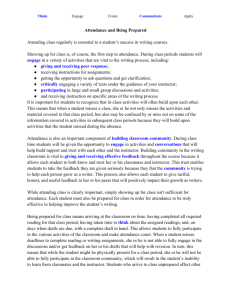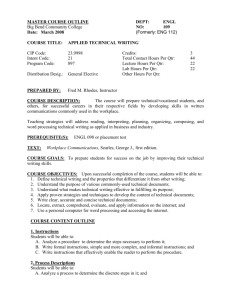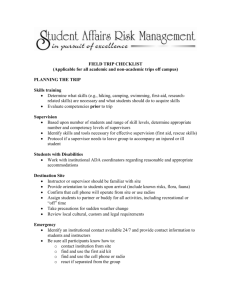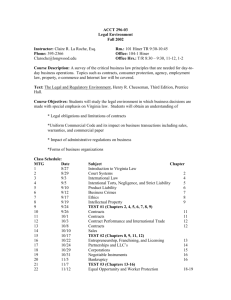SOC& 201 - Big Bend Community College
advertisement
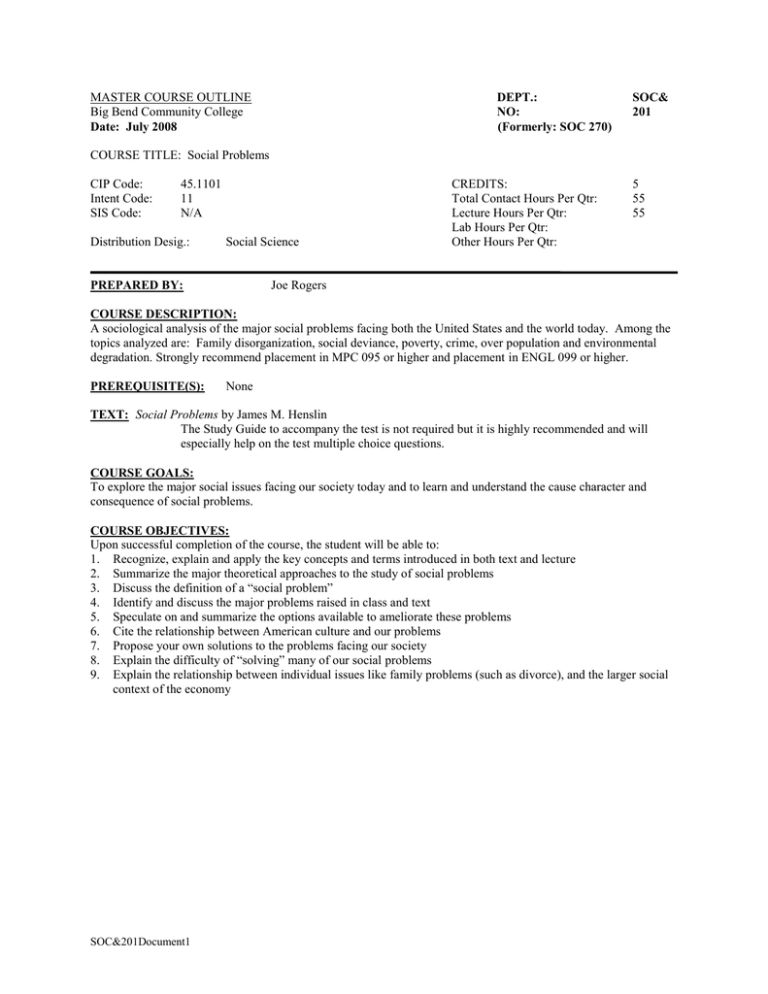
MASTER COURSE OUTLINE Big Bend Community College Date: July 2008 DEPT.: NO: (Formerly: SOC 270) SOC& 201 COURSE TITLE: Social Problems CIP Code: Intent Code: SIS Code: 45.1101 11 N/A Distribution Desig.: Social Science PREPARED BY: CREDITS: Total Contact Hours Per Qtr: Lecture Hours Per Qtr: Lab Hours Per Qtr: Other Hours Per Qtr: 5 55 55 Joe Rogers COURSE DESCRIPTION: A sociological analysis of the major social problems facing both the United States and the world today. Among the topics analyzed are: Family disorganization, social deviance, poverty, crime, over population and environmental degradation. Strongly recommend placement in MPC 095 or higher and placement in ENGL 099 or higher. PREREQUISITE(S): None TEXT: Social Problems by James M. Henslin The Study Guide to accompany the test is not required but it is highly recommended and will especially help on the test multiple choice questions. COURSE GOALS: To explore the major social issues facing our society today and to learn and understand the cause character and consequence of social problems. COURSE OBJECTIVES: Upon successful completion of the course, the student will be able to: 1. Recognize, explain and apply the key concepts and terms introduced in both text and lecture 2. Summarize the major theoretical approaches to the study of social problems 3. Discuss the definition of a “social problem” 4. Identify and discuss the major problems raised in class and text 5. Speculate on and summarize the options available to ameliorate these problems 6. Cite the relationship between American culture and our problems 7. Propose your own solutions to the problems facing our society 8. Explain the difficulty of “solving” many of our social problems 9. Explain the relationship between individual issues like family problems (such as divorce), and the larger social context of the economy SOC&201Document1 COURSE CONTENT OUTLINE: Week 1,2,and 3 Chapter and Topic Chapter 1 How Sociologists View Social Problems: The Abortion Dilema Chapter 2 Interpreting Social Problems: Aging Chapter 3 Prostitution, Homosexuality and pornography Chapter 4 Alcohol and Other Drugs Chapter 5 Violence in Society: Rape and Murder TEST #1 CHAPTERS 1, 2, 3, 4, 5 and lecture Thursday, Week 4 Week 4,5,6 and 7 Chapter and Topic Chapter 6 Crime and Criminal Justice Chapter 7 Economic Problems: Wealth and Poverty Chapter 8 Race and Ethnic Relations Chapter 9 Sex Discrimination Chapter 10 Medical Care: Problems of Physical and Mental Illness TEST #2 CHAPTERS 6, 7, 8, 9, 10 and lecture Thursday Week 7 Week 8, 9, 10, and 11 Chapter and Topic Chapter 11 The Changing Family Chapter 12 Urban Problems Chapter 13 Population and Food Chapter 14 The Environmental Crisis Chapter 15 War, Terrorism, and the Balance of Power *TEST 3RD AND FINAL TEST Chapters 11, 12, 13, 14, 15 and lecture *as scheduled during finals week FIELD TRIP: This class includes a mandatory field trip to visit one of the state’s penitentiaries. If, for some reason, a student cannot make this trip, a written summary, three pages typed, of a journal article from the library on corrections or prisons will substitute. TESTING: There are three tests in this class. Each will consist of: 1. Multiple Choice/True and False questions (60-80) chosen mainly from the textbook 2. 4 to 5 identify terms 3. One to three short answer essay questions The third and final test will not be comprehensive. SOC&201Document1 ATTENDANCE AND CLASSROOM PARTICIPATION: Your regular attendance to this class is expected and participation appreciated. If you know ahead of time that you must miss a class--be sure to mention it to the instructor. If you do miss class it is your responsibility to recover the missed material. Ask your classmates for notes and check with the instructor for any handouts or special instructions. *If you have perfect or near perfect (one miss) attendance and good classroom participation you can expect your grade to go up perhaps from a 2.4 to a 2.6. If your attendance is poor (four or more misses), your grade goes down. ATTENDANCE AND TESTS: You must be present on test day. There are three tests and no makeups. If you cannot be in class on test day, you must make arrangements with the instructor prior to the test. DEBATES: Each student must participate (as a team member) in two debates, one as his or her team proposes an action or position the other attacking or criticizing another team’s arguments. Debate grades worth 100 points 1. Proposal 80 points 2. Critique 20 points 100 points FINAL GRADES ARE DETERMINED BY: 1. Test grades 2. Team debates 3. Prison report on trip 4. Attendance and participation 300 points. 3 tests @ 100 points each 100 points 10 points additions or subtractions to the final grade based on participation “Any student who feels he or she may need an accommodation for any type of disability, please make an appointment to see the instructor during office hours or contact the Disabled Students Services personnel in the Activities Office.” PLANNED TEACHING METHODS/LEARNING STRATEGIES: X Lecture Laboratory Supervised Clinical X Small Group Discussion X Audiovisual Individualized Instruction Special Project Other (List) X Field Trip Division Chair Approval SOC&201Document1
